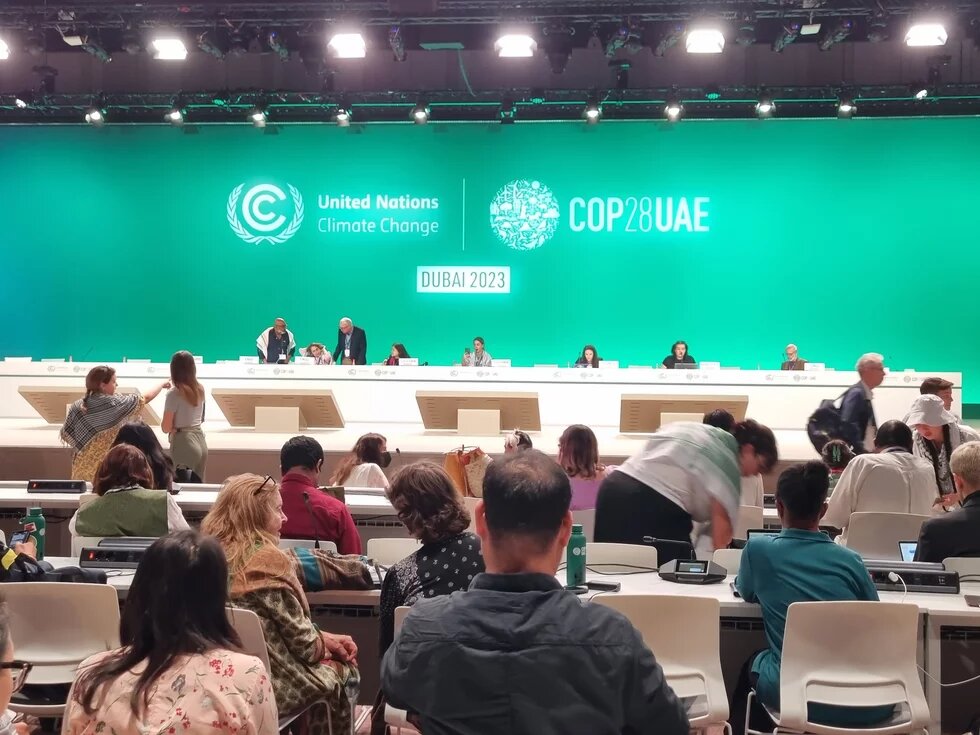After nearly 100,000 delegates have now gone back home to their national realities, there are several things which must be said about COP28 in Dubai. As is the case every year, the result was not ideal. The conference started with a major announcement of an agreement on a Loss and Damage Fund and countries providing the first money for it. Later, the goal of tripling renewables and doubling energy efficiency by 2030 came as good news. However, the hopes for such good news to continue were fast forgotten when the stocktaking text was prepared. The final text does include several good parts for which it was necessary to fight. It also covers the ugly side of a world still struggling to cope as a whole with climate urgency.

The concerns about an OPEC country such as the United Arab Emirates organizing this year’s COP and about it being presided over by the CEO of one of the biggest oil companies in the world were probably right, somehow. Most of the time Sultan Al Jaber did encourage the countries to act in a united way and to deliver an ambitious result, but any ideal image was marred by his unfortunate statement about the scientific basis for a fossil fuel phaseout and by the fact that OPEC did actively lobby to weaken the final texts. The plenaries were full of representatives of Saudi Arabia and other OPEC countries fighting against fossil fuel phaseout, which was the biggest point this year. However, other countries fought back, and at some point it looked like this year it was the rest of the world against Saudi Arabia, or OPEC itself.
On the other hand, more countries than just the major representatives of the UN did try to push the delegates to adopt more scientifically-based treaties. After the first draft of the highly anticipated text on global stocktaking was published, it looked like the majority of countries had realised this was no time to stick to their “red lines” on minor details and they seemed to come together to fight for major points as a united front. More than 130 countries united to push for fossil fuel phaseout wording in the text. Lots of countries repeated one and the same word after the first, very weak, draft text was published: “Unacceptable”.
That task was echoed by civil society organisations, which sent representatives from all over the world to Dubai. As they are every year, environmental and human rights organisations were a vital part of the COP. For the first time ever, protests were held in this geographic area, even if only on the grounds of the blue zone of COP28, the separate, small world where things were possible which were otherwise forbidden in the the rest of the UAE - possible, but not easy. Every year the areas for protests at COP have stricter borders and are more controlled. This year the activists were pushed to the on edge of fury by the high control, the censorship of banners and even the cancellations of planned protests. During the final days the protests were growing and the pressure was more and more visible. Holding the line, not just metaphorically, but maintaining an actual line of protesters outside the plenary was their main message to the negotiating delegates.
The final text does not include the phaseout wording. Instead, the COP came up with a compromise: “Transition away” from fossil fuels was the wording that delivered the agreement. The need to follow the scientific evidence is also stated. These two points seem to be historical, new steps in this text. As shocking as it sounds, this was something that still needed to be negotiated during the hottest year in history even as more and more extreme climate impacts are occurring all over the world.
It looks like the whole complex agenda of COP28 was narrowed down to the issue of phaseout just in the last two days. The final text still has some disturbing points in it. The mentions of “transitional” fuels, carbon capture and storage, nuclear and other formulations are still trying to open up ways for the fossil fuel industry to continue their destructive activities and are red flags reminding everybody that this fight is far from over and is continuing on national grounds. The adaptation text was a pure disappointment, leaving the issue open for next year. Although the Loss and Damage Fund framework was agreed, it is not ideal, and the questions of the annual replenishing of the fund and the rest of its financing were not included in a sufficient way. The really good news is that the energy efficiency and renewable resources goals are not just side pledges, but are included in the final text.
Al Jaber’s final speech was full of superlatives about what was achieved. That was clearly not a correct evaluation of the result. Yes, the transition away from fossil fuels is what we need and as such it can be labelled as historic, but the final text as a whole is far from a breakthrough, as it still includes loopholes and points which are harmful unnecessary and vague. The treaty as a whole is not sending the world the signal that the age of fossil fuels might finally end. That signal was sent by the willingness of the majority of countries to finally be more guided by science and by the actual need for climate action, as we could see during the phaseout discussions. For a lot of people, this is the bigger signal, one which screams that we still have a lot to do and that time is running much faster then our historic steps are. At the end, as António Guterres told the opponents of a fossil fuel phaseout: “Whether you like it or not, a fossil fuel phaseout is inevitable. Let’s hope it doesn’t come too late.”


